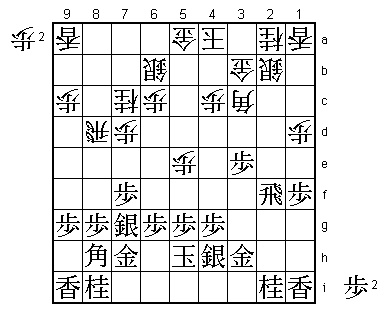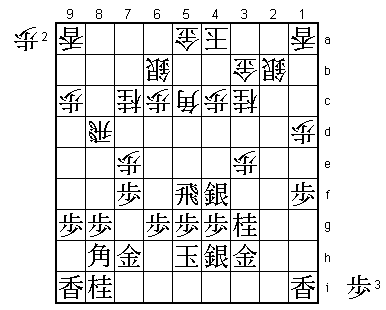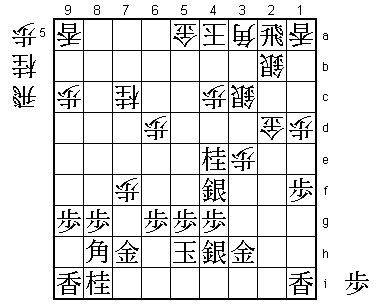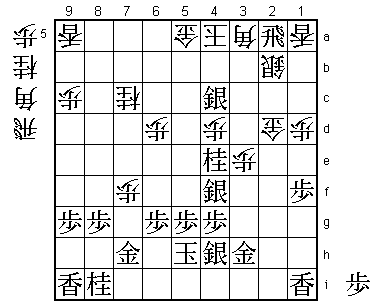18th Ryu-O Match Game 2
[Black "Watanabe Akira, Ryu-O"]
[White "Kimura Kazuki, Challenger"]
[Event "18th Ryu-O sen, Game 2"]
[Date "November 7th and 8th 2005"]
1.P7g-7f 00:01:00 00:00:00
2.P3c-3d 00:01:00 00:02:00
3.P2g-2f 00:05:00 00:02:00
4.G4a-3b 00:05:00 00:04:00
5.G6i-7h 00:09:00 00:04:00
6.P8c-8d 00:09:00 00:12:00
7.P2f-2e 00:12:00 00:12:00
8.P8d-8e 00:12:00 00:13:00
9.P2e-2d 00:17:00 00:13:00
10.P2cx2d 00:17:00 00:14:00
11.R2hx2d 00:18:00 00:14:00
12.P8e-8f 00:18:00 00:19:00
13.P8gx8f 00:20:00 00:19:00
14.R8bx8f 00:20:00 00:20:00
15.R2dx3d 00:25:00 00:20:00
16.B2b-3c 00:25:00 00:25:00
17.R3d-3f 00:30:00 00:25:00
18.S3a-2b 00:30:00 00:28:00
19.K5i-5h 00:47:00 00:28:00
20.R8f-8d?! 00:47:00 00:52:00
With two specialists in the Yokofudori, the opening is not a big surprise,
but pulling back the rook to 8d instead of 8e is. The general opinion
among professionals is that with the rook on 8d it is more difficult to
win for white than with the rook on 8e. This being said, Kimura was a
specialist in this way of playing before the R8e-Yokofudori became
fashionable. He is the man with the 70% career winning percentage, so
he has shown that he can win consistently with the rook on 8d.
21.G4i-3h 01:04:00 00:52:00
22.K5a-4a 01:04:00 01:04:00
23.P*8g 01:11:00 01:04:00
24.S7a-6b 01:11:00 01:09:00
25.R3f-2f 01:22:00 01:09:00
26.G6a-5a 01:22:00 01:31:00
27.S3i-4h 01:28:00 01:31:00
28.P5c-5d 01:28:00 02:09:00
29.P3g-3f 01:43:00 02:09:00
30.P5d-5e 01:43:00 02:17:00
31.S7i-6h 01:45:00 02:17:00
32.P7c-7d 01:45:00 02:29:00
33.P3f-3e 02:16:00 02:29:00
34.N8a-7c 02:16:00 02:44:00
35.P1g-1f 02:25:00 02:44:00
36.P1c-1d 02:25:00 03:31:00
37.S6h-7g! 02:36:00 03:31:00

Kimura might have made a mistake in setting up this game, because this
silver maneuver gives white a lot of trouble. The aim is to take the pawn
on 5e, which is supposed to the stronghold of the white attack. After the
game, Watanabe said that with pushing the edge pawns, this silver attack
gives white a lot of trouble. It is likely that he either played it himself,
or had it played against him in a training game.
38.B3c-4d 02:36:00 03:38:00
39.S7g-6f 02:58:00 03:38:00
40.B4dx3e 02:58:00 03:51:00
41.R2f-3f 03:01:00 03:51:00
42.B3e-5c 03:01:00 03:53:00
43.S6fx5e 03:46:00 03:53:00
44.P7d-7e 03:46:00 04:04:00
45.N2i-3g 03:50:00 04:04:00
46.P*3e 03:50:00 04:11:00
47.R3f-5f 04:15:00 04:11:00
48.N2a-3c 04:15:00 04:20:00
Kimura said he already felt he was in trouble for a while, but the professionals
in the press room still thought this was a difficult position. For example,
49.S5d fails to 50.P*5e Rx5e (Bx5e Rx5d) B4d R5f Bx8h+ Gx8h P*5e Rx5e B*4d
which is bad for black. The silver on 5e looks strong, but how to continue
from here...
49.S5e-4f! 04:20:00 04:20:00

A difficult move to find. The black rook, silver and knight are ready to attack,
so drawing back the silver is not something one wants to do. Black aims at opening
the rook and bishop files and setting up N4e at the same time. If black can exchange
the knights (N4e Nx4e Sx4e), then there will be a lot of pressure on the white
position.
50.P7ex7f 04:20:00 05:29:00
Kimura spent a painful hour to try and find something to counter the black plans,
but unfortunately for him there is nothing. For example, 50.R2d P*2e R7d N4e Nx4e
Sx4e and N*2d or P*3c next is very good for black. "Playing natural moves should
win" (Watanabe).
51.P*2c 04:51:00 05:29:00
52.G3bx2c 04:51:00 05:37:00
Or 52.Sx2c N4e Nx4e Bx1a+ is also good for black.
53.R5fx5c+ 04:51:00 05:37:00
54.S6bx5c 04:51:00 05:37:00
55.B*7e 04:51:00 05:37:00
56.R8d-6d 04:51:00 06:16:00
57.P*2d 04:55:00 06:16:00
58.G2cx2d 04:55:00 06:40:00
59.B7ex6d 04:58:00 06:40:00
60.P6cx6d 04:58:00 06:41:00
61.R*2a 05:00:00 06:41:00
62.B*3a 05:00:00 06:43:00
63.N3g-4e 05:03:00 06:43:00
64.S5c-4b 05:03:00 06:53:00
65.N4ex3c+ 05:09:00 06:53:00
66.S4bx3c 05:09:00 06:54:00
67.N*4e 05:09:00 06:54:00

68.S3c-4d 05:09:00 07:13:00
There is nothing else. White has the tricky 69.P7g+, aiming at 70.Bx7g S4d Bx4d
Px4d S*4c N*6f and now Px6f B*7f forks the king and silver on 4c, while K4i can
be answered by G5b, because now N5c+ Gx4c +Nx4c and the black king is mated after
R*2i (G3i B*2g and S*5h; S3i S*5h and B*5i). However, black can just ignore the
pawn promotion and play 70.Nx3c+. Then 71.+Px7h +Nx2b wins because there is no
mate after R*6h K4i R6i+ S*5i. The interesting question is whether white could
have played P7g+ earlier and get into the variation above at this point. The answer
is no. With an extra pawn in hand, black doesn't have to play 67.N*4e, but can
play 67.P*3d instead. Then 68.Gx3d (Sx3d Bx2b+) P*2c and the white position
collapses. The conclusion is that the game was over after 49.S4f.
69.B8hx4d 05:12:00 07:13:00
70.P4cx4d 05:12:00 07:13:00
71.S*4c 05:12:00 07:13:00
Resigns 05:12:00 07:24:00

Kimura took eleven minutes to resign, but there is no defense. The simple mating
threat is N5c= next and 72.G5b fails to 72.N5c+ Gx5c (Gx4c +Nx4c) Rx2b+ and hisshi.
A convincing win by Watanabe, who outplayed Kimura in this game. All is not lost,
but Kimura now desperately needs to win the third game to avoid a near decisive 3-0
deficit. He has black in that game, so there are definitely possibilities to get
back in this match. The problem is that he has only one week to recover from the
shock of a bad loss. Will this be enough?



